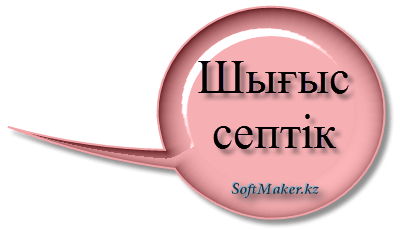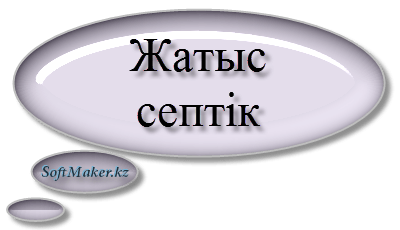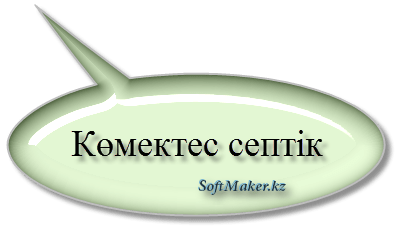Original case (shyǵys septik) of nouns in the Kazakh language, the description and examples
The original case (shyǵys septik) Kazakh language corresponds to the Subjective Case in English with the preposition from, of, with, out, since.
| Qazaq | English |
| qoryqqan-nan | with fright |
| ash-tan | from hunger |
| qulyn-nan | from a foal |
| taý-dan | from the mountain |
Questions
The original case (shyǵys septik) answers questions kimnen? (from whom?), neden? (from what?), qaıdan? (where from?), qashannan? (since when?) and is used to indicate the starting point of the action of the subject or what the object is made of.
| Qazaq | English | Question |
| Men ylǵı dosym-nan aqyl suraımyn | I always ask advice from my friend | kimnen? |
| Ol qyzy-nan kele jatyr | He goes from his girlfriend | kimnen? |
| Olar aq un-nan nan jasaıdy | They made bread from white flour | neden? |
| Ol jibek-ten kóılegin tigip otyr | She is sewing a dress made of silk | neden? |
| Men dúken-nen kele jatyrmyn | I’m back from the store | qaıdan? |
| Ol jınalys-tan kele jatyr | He returns from the meeting | qaıdan? |
| Keshe-den osynda | Been here since yesterday | qashanan? |
| Toǵyz-dan júrip jatyr | Starting with nine | qashanan? |
Endings
Nouns in the original case (shyǵys septik) take endings -dan (-dan), -tan (-ten), -nan (-nen):
- If the base of the word ends in vowels -a, -á, -e, -ı, -ý, -y, -i, (except -y and -і in the cases of the 3rd person form), voiced consonants -j, -z or sonorants -l, -r, -ý, then the endings -dan/-den are added to it.
Qazaq English Serik kala-dan keldi Serik came from the city Teńgeni qaǵaz-dan jasaıdy Tenge made from paper Biz stýdentter-den emtıhan alamyz We take exams from students Men dáriger-den kele jatyrmyn I’m coming from a doctor - If the final sound of word voiceless consonant -k, -q, -p, -s, -t, -sh or ends with a voiced consonant -b, -v, -g, -ǵ, -d, then the endings -tan/-ten are added to it.
Qazaq English Marıam zavod-tan keldi Mariyam came from the factory Almas ınstıtýty-tan keldi Almas returned from the Institute Men Peterbýrg-ten kele jatyrmyn I’m coming from Petersburg Qaımaqty sút-ten jasaıdy Sour cream is made from milk - If the base word ends in conomie consonants -m,-n,-ń and in cases of the third person possessive form with affixes -y/-i, -sy/-si after the root of the word, then the endings -nan/-nen are added to it.
Qazaq English Brıgada aýdan-nan keldi The team returned from the area Ol meıram-nan kele jatyr He is coming from a holiday Ákem-nen hat aldym I received a letter from my father Ájeń-nen habar bar ma? Have you heard from your grandmother?
Meanings
In the Kazakh language, the original case (shyǵys septik) has the following meanings:
-
- The starting point of action and movement:
Qazaq English Sársen demalys-tan keldi Sarsen came back from vacation Stýdentter praktıkasy-dan keldi The students are back from practice Omar mektep-ten molla shyqty Omar got out of school Men qazy-dan kele jatyrmyn I’m coming from the judge - Compare items:
Qazaq English Muhıt teńiz-den úlken The ocean is bigger than the sea Asqar-dan Bolat kishi Bolat is younger than Askar Altaı-dan Sáken úlken Saken is smaller than Altai Balhıa-dan Ámına jasy Amina is younger than Belgii - The material that the item is made of:
Qazaq English Qaǵaz-dy* shyrsha aǵashy-nan jasaıdy Paper is made from spruce wood Balshyq-tan kirpish jasaıdy Bricks are made from clay Nan-dy* un-nan pisiredi Bread is baked from flour Úıler-di* tas-tan salady Houses are built of stone * The accusative ending is attached here.
- Onset of action in time:
Qazaq English Instıtýtta birinshi qazan-nan dáris bastalady Lectures at the Institute begin on the first of October Jumys zaýytta saǵat segiz-den bastalady Work at the factory starts at eight o’clock Erteń-nen bastap leksıaǵa baramyn I’ll start going to lectures tomorrow Keshe-den bastap qar jaýady It’s been snowing since yesterday
- The starting point of action and movement:



